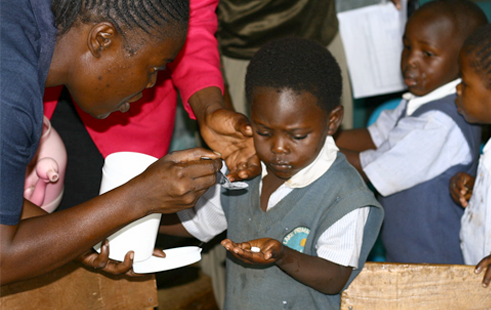 Teacher administers deworming treatment to a school girl in Kenya
Teacher administers deworming treatment to a school girl in Kenya
29 October 2019 | Geneva – Recent data published by the World Health Organization (WHO)1 confirm that in 2018, more than one billion people were again treated for at least one of five2 neglected tropical diseases (NTDs) targeted for control and elimination.
In 2015 this milestone was achieved for the first time.
Reports received from countries endemic for these diseases show that large-scale treatment campaigns, also known as mass drug administration, were used to distribute more than 1.7 billion treatments3 to populations in need.
Treating affected or populations at risk of NTDs is relevant for achieving Sustainable Development Goal (SDG) 3.3 set for NTDs – universal health coverage – and the principle of “leaving no one behind”.
Reaching more than 1 billion people with essential curative and preventive packages every year makes a huge contribution to WHO’s strategy of “reaching the triple billion”, as outlined in its 13th General Programme of Work, and to attaining the SDGs.
The global NTD programme coordinates the delivery of billions of tablets annually, worth hundreds of millions of United States dollars, to the most marginalized, neglected segments of the world’s population.
“Successful mass drug administration depends on advance planning and coordination among endemic countries, WHO, pharmaceutical and shipping companies to ensure that donated medicines reach the point of delivery in the community in a timely manner,” said Dr Gautam Biswas, Coordinator of WHO’s Preventive Chemotherapy and Transmission Control unit. “A responsive logistics and information system is crucial to avoid bottlenecks and wastage”.
Over the years and learning from experience, improved coordination and supply and delivery processes have sustained elimination of diseases such as lymphatic filariasis and trachoma and supported the expansion of interventions against onchocerciasis, schistosomiasis and soil-transmitted helminthiases.
Evaluating supply management
Despite progress in the timeliness and availability of medicines, work must continue to ensure the process is rock solid. One measure is to closely monitor and use and report donated medicines rationally to avoid oversupply, misuse and waste.
“From time to time, we conduct missions to countries experiencing difficulties in order to address supply chain issues and review disease epidemiology, programme performance and treatment data,” said Dr Afework Tekle, WHO Project Manager for delivery of donated medicines. “In so doing, we provide technical assistance on the effective use of available tools, raise awareness about supply chain management and identify practical solutions”.
WHO used the findings and information collected during joint missions involving Regional Programme Review Groups4 and ministries of health5 to revise the amounts of medicines required for MDA in 2018; left-over medicines were used elsewhere.
Coordination with recipient countries is essential to identify challenges rapidly and accelerate progress towards the goal of eliminating NTDs.
Related link
---------------------------------------
1Global update on implementation of preventive chemotherapy against neglected tropical diseases in 2018. Wkly Epidemiol Rec. 2019; 94:425–440
2In 2018, a total of 1 billion 120 million people in 74 countries received treatment: 149.4 million for onchocerciasis; 551.9 million for lymphatic filariasis; 89.1 million for trachoma; 93.7 million for schistosomiasis; and 571.8 million for soil-transmitted helminthiases.
3For some diseases, more than one tablet is needed according to the height and age of the individual.
4Regional Programme Review Groups provide overall strategic and operational review of country and regional NTD programmes to help accelerate the control and elimination of targeted NTDs.
5In 2018, WHO carried out joint missions in five countries: Côte d’Ivoire, Ghana, Madagascar, Malawi and Senegal.





 Manual for case management of cutaneous leishmaniasis in the WHO Eastern Mediterranean Region [pdf 195Mb]
Manual for case management of cutaneous leishmaniasis in the WHO Eastern Mediterranean Region [pdf 195Mb] Framework for action on cutaneous leishmaniasis in the Eastern Mediterranean Region 2014–2018 [pdf 364kb]
Framework for action on cutaneous leishmaniasis in the Eastern Mediterranean Region 2014–2018 [pdf 364kb]